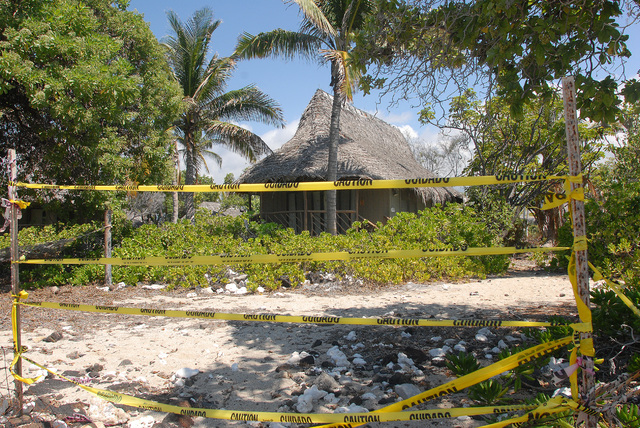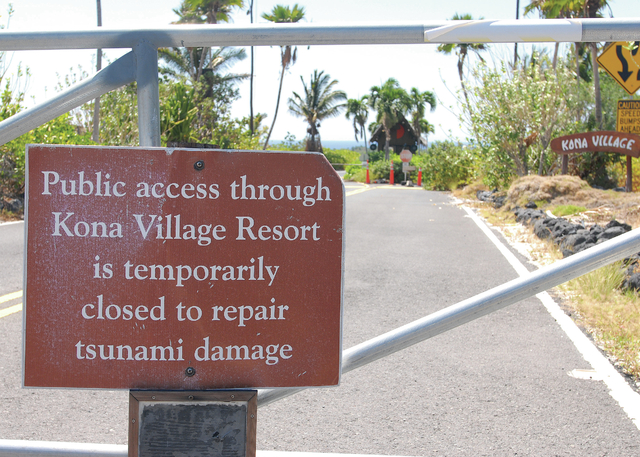KAILUA-KONA— The once-iconic Kona Village Resort is set to reopen by 2019, after an agreement made public Thursday.
KAILUA-KONA— The once-iconic Kona Village Resort is set to reopen by 2019, after an agreement made public Thursday.
Kamehameha Schools, the owner of the property, has granted a ground lease that “allows Kennedy Wilson to immediately begin the process of restoring and enhancing the 81.4-acre property while maintaining a clear focus on retaining the original vision as a low density iconic destination,” the two groups said in a press release.
In addition, the agreement allows for the rehabilitation of the 125 vacation bungalows, the property’s infrastructure as well as other operational improvements, the release said.
The resort was built in 1965 and heavily damaged in the March 2011 tsunami, when it employed 250 people. After years of financial and land lease issues, the luxury Hawaii island vacation destination is ready to enter a new chapter.
“This agreement is a testament to the commitment and diligence of all parties that will reconnect the resort with the Kona community,” said Walter Thoemmes, Kamehameha Schools’ managing director of commercial real estate, in the release. “Kona Village will provide much needed jobs for the West Hawaii region and will perpetuate Native Hawaiian identity through its rich cultural history. We are excited to have a project partner that maintains the vision.”
Before the agreement, the legal issues had extended across nine different groups.
“This agreement will put an end to all those filings,” said Aron Dote, of Kamehameha Schools.
The ground lease was issued to Kennedy Wilson, a Beverly Hills-based holding company.
“Kennedy Wilson is humbled to become the next steward of the iconic Kona Village Resort,” said Dave Eadie of Kennedy Wilson in a press release.
He added the company “has been involved in Hawaii for over a quarter century and embraces and respects Hawaiian culture and the protection of Hawaii’s natural resources.
“We take great pride in the fact that returning the Kona Village Resort to full service will provide stable jobs for scores of Hawaii island residents,” he said.
After the tsunami, a series of legal and financial difficulties stunted the resort’s recovery. At first, however, it seemed the resort would be back to business quickly.
The 2011 tsunami damage included 20 hale, or bungalows, off their foundations, reported then-Civil Defense Administrator Quince Mento, but he said at the time the resort area was expected to be closed for a “few days.”
By March 16, 2011, a few weeks after the initial assessment, the recovery timeline had extended to “at least the next two weeks,” according to Karine Joret of the Joret Group, the company’s media relations. On that same day, Kona Village Resort CEO Patrick Fitzgerald said “damage is obviously going to be in the millions. And, it could be substantially higher than that.”
The damage included destroyed underground utilities and 7-foot high water lines on restaurants. The pond, 500 feet from the waterline, was crowded with furniture and household goods.
By 2012, Fitzgerald said a reopening would be some time in 2013 or later.
Then, on Nov. 4, 2012, Duetsche Bank Trust Co. and KW Kona Investors filed suit against Kona Village Resort, seeking payment for a total of $86.4 million in loans.
Kamehameha Schools also moved against the management company, seeking to foreclose on the mortgage. Other companies joined in until nine different organizations were involved.
Trial was set for Sept. 27, but the agreement was reached ahead of that point.
“We are well aware of the trust that Kamehameha Schools has placed in us in choosing Kennedy Wilson to protect and preserve such a culturally significant resource for the benefit of all Hawaii Island residents and the thousands of guests around the globe who consider the Kona Village Resort one of the most special places in all the world,” Eadie said.


